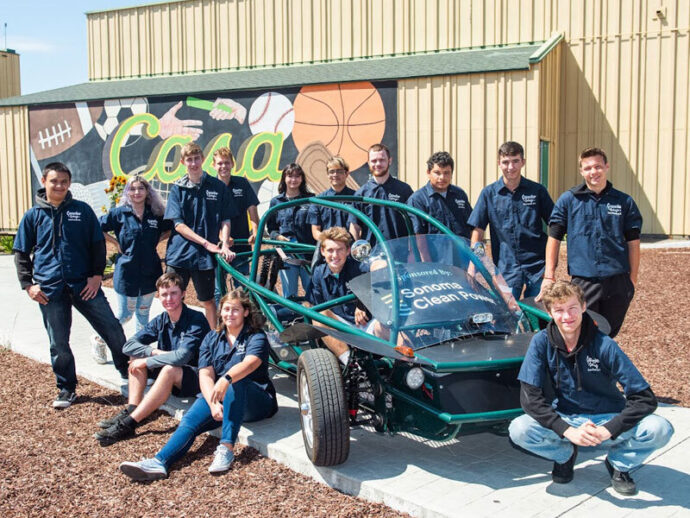Published on 12/03/2024
Historically, vocational programs, what are today known as Career Technical Education (CTE) have been vulnerable to budget cuts. This trend was exacerbated by the No Child Left Behind Act of 2001, which made school funding increasingly dependent on standardized test scores. This led many schools to divert resources to academic courses that would enhance these test scores, often at the expense of a more comprehensive educational experience.
The consequence of this shift was a tangible skill gap, particularly in trade professions. Moreover, students who couldn't afford higher education, notably those in economically disadvantaged communities, found themselves without the basic skills and career readiness needed to directly enter the workforce.
To counteract this trend locally, Career Technical Education Foundation was established in 2012 in Sonoma County. Since its inception, the Foundation has incentivized the expansion and enhancement of high school career technical education courses aligned specifically to local workforce and economic development needs. Through this effort, more than $10 million has been invested in local career exploration programs linking academics to local industries and jobs in engineering, manufacturing, agriculture, healthcare, hospitality, and more.

In 2015, Sonoma Clean Power collaborated with CTE Foundation, as well as the Sonoma County Office of Education and Switch Vehicles, to deliver The Switch Lab™ EV program. This initiative educates students on various aspects of electric vehicle technology, including design, manufacturing, and maintenance. As part of the curriculum, students collaborate on building an electric vehicle, gaining both theoretical and practical skills in advanced mathematics and science. They even learn teamwork skills and explore career possibilities in green technology sectors.
Michelle Hickey, COO at Switch Vehicles states that “global interest in The Switch Lab has skyrocketed in 2023 due in part to the growing demand for a trained EV workforce and engineers who can design and manufacture electric vehicles, components, charging stations, and batteries. The unique open-chassis design of The Switch allows an entire classroom to collaborate on the build, developing professional skills like teamwork, communication, critical thinking and problem-solving. Plus, The Switch is a fun, engaging project that students get excited about.”
California, being at the forefront of electric vehicle adoption and other efforts toward clean energy use, urgently needs skilled workers in multiple trades, including electrification, engineering, and automotive technology. The Switch Lab aims to address this shortage by equipping students with the skills necessary to excel in these emerging fields, as well as other fields in the green energy space. At the end of the school year, students have the opportunity to participate in the Switch EV Rally, where they can showcase what they have learned, check out the work of other Switch Lab students, and engage in fun, hands-on activities.
Students today are seeking engagement and relevancy in their educational experience, and they also really care about the future of our planet and climate resiliency. This partnership provides the type of hands-on, real-world approach to learning that students need while delivering a model of career technical education in local schools that better prepares youth for life after high school.

CEO
CTE Foundation
Uniquely, the program also teaches resilience and problem-solving through its focus on learning from failure. This is an essential skill set that is often underemphasized in traditional educational settings but is crucial for innovation and adaptability.
“Students enjoyed learning how to work with tools and each other while they assembled the Switch EV,” says Matt O’Donnell, a Switch Lab instructor at Healdsburg Junior High. “At times, students would assemble components incorrectly, but it taught them to persevere and try different ideas until they found the correct way that components worked together. Students loved this project and enjoyed learning about electricity, sustainability, suspension, steering, and the brake system.”
Since its inception, The Switch Lab has engaged more than 3,000 students across Sonoma and Mendocino Counties and has been implemented in 10 schools. The feedback from both students and educators has been overwhelmingly positive, affirming the program's impact. One of the students who took The Switch Lab class in 2022-23 said “The course helped me explore different careers such as engineering, design, and automotive mechanics. The course was interesting, fun, and informative.”
Research corroborates the efficacy of CTE programs. For instance, a 2019 study from the University of Nevada, Reno, indicated that students who completed a CTE pathway scored substantially higher on ACT assessments compared to their counterparts who didn't. Federal studies have shown that students who participate in CTE programs have a 95% graduation rate, roughly 10% higher than the national average. According to YouthTruth survey data, Sonoma County CTE students report higher levels of readiness for college and career; stronger levels of connectedness to their peers and adults at school; and higher levels of engagement in their learning.
Students loved this project and enjoyed learning about electricity, sustainability, suspension, steering, and the brake system.

Switch Lab instructor
Healdsburg Junior High
Sonoma Clean Power’s considerable investment in The Switch Lab is an investment not just in education but in our future. Today’s High School students have grown up surrounded by the impacts of climate change and students in Sonoma and Mendocino counties have already lived through unprecedented wildfires, drought, storms, and flooding. These students will grow up to lead the fight against climate change, and thanks to the partnership between Sonoma Clean Power, CTE Foundation, and The Switch Lab, they will be equipped with the foundational skills necessary to thrive.
Students today are seeking engagement and relevancy in their educational experience, and they also really care about the future of our planet and climate resiliency. This partnership provides the type of hands-on, real-world approach to learning that students need while delivering a model of career technical education in local schools that better prepares youth for life after high school..” Kathy Goodacre, CEO of CTE Foundation.